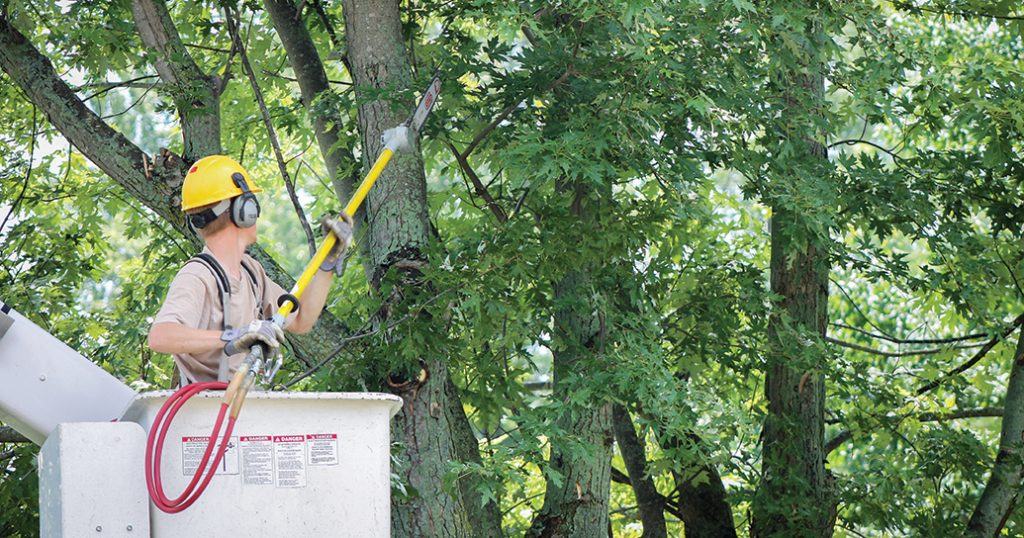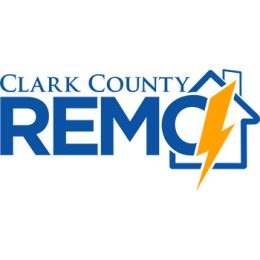
by Eric Melton
If you’ve met me, you most likely talked with me about a potentially upsetting topic — the trees in your yard.
As right-of-way supervisor at Clark County REMC, I’m the one responsible for ensuring the power lines throughout our service territory are free and clear of obstructions like tree branches. Those branches — often growing from trees that have graced your yard for years —probably add to the ambiance of your property, especially in the spring and summer. But when the trees are located too close to power lines, they not only become dangerous to you, your family and co-op employees, they can cause power outages and ultimately impact your power bill. Let me explain:
• Clark County REMC’s power lines can carry up to 12,470 volts of electricity. When branches come in contact with them, they become energized. If someone touches that energized branch — or if a child should climb a tree close to a power line — he or she could be electrocuted.
• Healthy trees grow — usually four to six feet a year. Trimming the same trees that are growing under and around power lines is an expense that every REMC member must ultimately bear. If our crews have to revisit the same trees every couple of years, that translates to money lost for your co-op and its members.
• If a tree makes contact with a power line — especially during storms with high winds and ice — it could damage electrical lines and equipment. When that happens, power outages occur. None of us want that to happen! So, we have a vegetation management program to control tree growth underneath and around our power lines. We start with physically cutting and clearing the area, and then follow up with a herbicide spray program to prevent trimming the same area next year. This saves our members money, is better for the environment, and allows native grasses and wildflowers to reclaim areas where thick, wooded plants once dominated.
Your REMC is diligent about cutting back branches that are growing into the electric lines — and, in extreme situations, cutting down the tree itself. Believe me: I’m a nature-loving homeowner who appreciates foliage and curb appeal, so I understand that having us chainsaw that beautiful maple tree you yourself planted in your yard years ago is not something you’re happy about.
Clark County REMC also understands that parting with beloved trees can be difficult even if you “get” why it’s important to keep rights-of-way near power lines clear. (Trees should be planted at least 10 feet away from power lines.) Our “Trade a Tree” and “Grind a Stump” programs should lessen some of your hesitancy.
Through the “Trade a Tree” program, for every tree that we remove in your yard, you will receive a $75 gift certificate which you can use at a local nursery. You can use the gift certificate to purchase another tree, flowers, or another landscaping item. Those at the nursery can help you select a tree to plant that won’t grow into power lines in the future.
If you choose to forego the $75 gift certificate, you may be interested in the “Grind a Stump” program in which we grind the tree stump for you at no cost. We want to ensure that even though the tree is gone, your yard still looks good.
I discuss these two programs in detail to homeowners whose trees encroach power lines.
With a 30-plus year career in vegetation management, keeping lines clear and power flowing reliably is a personal mission for me. It really hits home for me when the co-op’s linemen tell me how nice it is when they don’t have to work around debris in and underneath the lines. They’re able to restore power to you more quickly which is something we all want.
If you have any questions about Clark County REMC’s right-of-way program as well as the “Trade a Tree” and “Grind a Stump” programs, feel free to give me a call at 812-248-7502.
ERIC MELTON is right-of-way supervisor at Clark County REMC.



